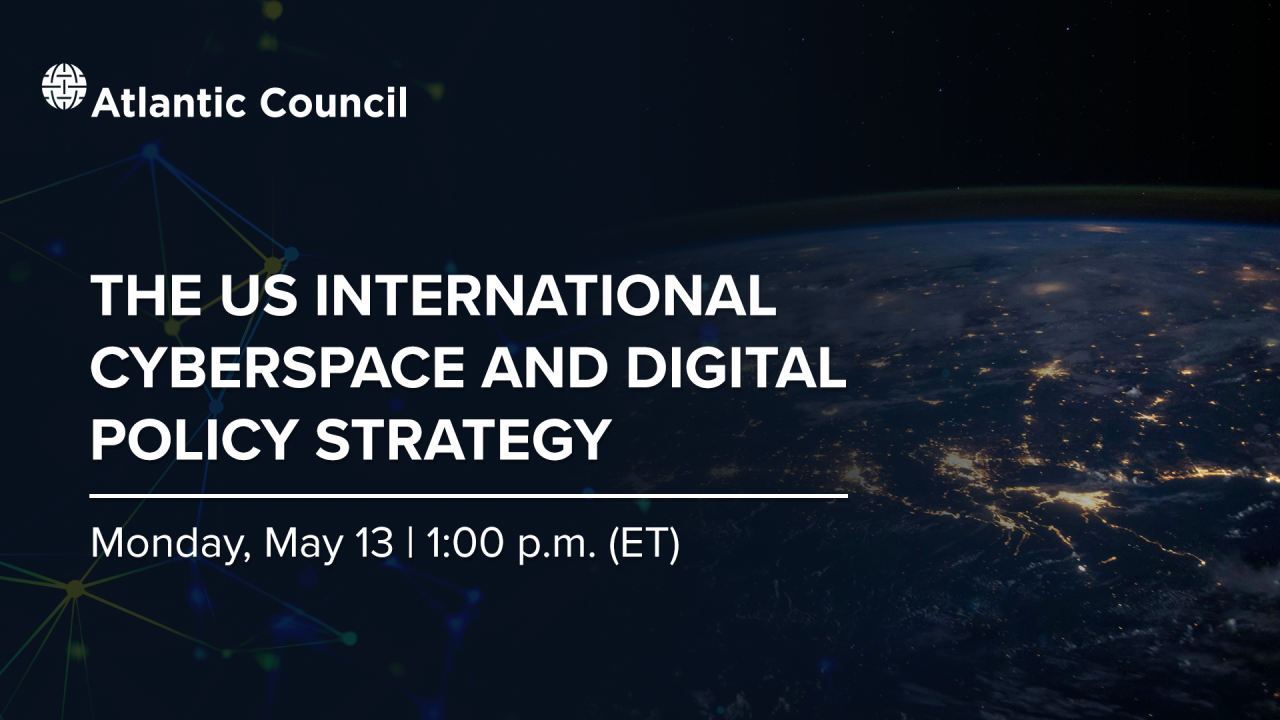International Cyberspace & Digital Policy Strategy: AC Tech Programs Markup
On May 6, the Department of State released the United States International Cyberspace & Digital Policy Strategy. Read along with AC Tech Programs staff, fellows, and experts for commentary and analysis.
International Cyberspace & Digital Policy Strategy: AC Tech Programs Markup
Share this story

Last week, the State Department released its first ever International Cyberspace and Digital Policy Strategy. America’s top diplomat travelled to a conference of computer programmers in San Francisco instead of a far-flung capitol to rollout the strategy, an early sign – echoed within the document – of the increasing centrality of the tech community in America’s role in the world.
An essential part of the strategy is the workforce behind it, as well as how the State Department is organizing itself on tech. In 2021, Secretary Blinken announced the creation of a new Bureau of Cyberspace and Digital Policy led by the first ever US Ambassador at Large. This brought together the parts of America’s foreign policy apparatus working on cyber, digital economy, and digital freedom policy into one entity capable of drawing on all elements of US power and resources, and capable of implementing such an ambitious strategy.
The strategy is a comprehensive outlook and, more importantly, an affirmative plan in an era of increasing geopolitical competition and dizzying technological change. It delineates three overarching principles which guide four strategic pillars supported by four areas of action with a combined twenty-three lines of effort—all centered around the idea of digital solidarity, of working together across all allies and partners for mutual advancement. The clarity with which the strategy lays out the US vision of this ecosystem is itself a significant step forward – especially as the Chinese and Russian governments work tirelessly to promote their authoritarian models through tech investment, policy, and use around the world. One could be forgiven for labeling this a purely “cyber” strategy, as it includes everything from AI innovation to international cyber norms to internet freedom to addressing state threats while protecting human rights online and much more. The strategy effectively escapes the confines of past perceptions that one must only be technical to contribute to tech policy.
Four common threads tie the tech strategy together. First, a strong endorsement of a rules-based order and an (often unwieldy) multistakeholder system deemed existential to keeping digital ecosystems open, interoperable, secure, and reliable. Second, an explicit connection between how the United States designs, funds, and governs technology at home and how it engages internationally. Third, an understanding of the tremendous tech advantages the United States enjoys matched with the necessity of working with allies and partners to realize them in an era of increased interdependence. Fourth, the existential need to be proactively for something, as opposed to an articulation of grievances and nefarious tech usage the United States stands against.
The strategy and the Bureau of Cyberspace and Digital Policy are new, so naturally the document is more a statement of purpose than actualized impact – a clearer goalpost for all those who care about the security and accessibility of this global domain. Much of what is laid out depends on how the new bureau gets specific in implementation and works with the rest of the department and US government, allies and partners, and even industry.
The work of the Atlantic Council Technology Programs – including the Cyber Statecraft Initiative, Democracy + Tech Initiative, Digital Forensic Research Lab, GeoTech Center, and a newly formed capacity building initiative – advances nearly every element of the strategy. In the following markup, a broad array of experts across our team and expert community share unique analysis, examples, and insights on the implementation that lay ahead.
Our markup contributors include Emerson Brooking, Safa Shahwan Edwards, Rose Jackson, Konstantinos Komaitis, Iria Puyosa, Trisha Ray, Emma Schroeder, Justin Sherman, Bobbie Stempfley, Kenton Thibaut, and Moira Whelan.
—Graham Brookie, Vice President, Technology Programs and Strategy, Atlantic Council
Table of Contents
Line of Effort 1: Promote Development and Adoption of Open, Inclusive, Secure, and Resilient Telecommunication Networks
Line of Effort 2: Further Common Understandings and Shared Principles for the Secure Use and Trustworthiness of Cloud Services, Data Centers, and Related Infrastructure Technologies
Line of Effort 3: Enhance Security and Resilience of Undersea Cables
Line of Effort 4: Pursue Shared Interests in the Development, Use, Resilience, and Security of Satellite Communication Networks
Line of Effort 5: Enhance the International Telecommunication Union’s Effectiveness, Transparency, and Accountability
Line of Effort 1: Support the Trusted Flow of Data and Advocate for Multistakeholder, Risk-Based Approaches to Digital and Data Governance
Line of Effort 2: Promote Common Understandings of Trust, Interoperable Standards, and Shared Values and Governance Principles for Critical and Emerging Technologies
Line of Effort 3: Ensure International Standards Processes are Transparent, Open, Inclusive, and Impartial
Line of Effort 4: Expand and Diversify Civil Society Participation in Multistakeholder Processes
Line of Effort 5: Advance a Common, Rights-Respecting Vision for the Digital Future
Line of Effort 6: Negotiate a Rights-Respecting Cybercrime Treaty
Line of Effort 7: Defend Information Integrity
Line of Effort 1: Pursue Action-Oriented Discussions Focused on Norm Implementation at the UN
Line of Effort 2: Disrupt and Build Resilience to Malicious State Activity
Line of Effort 3: Support Allies and Partners Amid Malicious Activity
Line of Effort 4: Hold Irresponsible States Accountable
Line of Effort 5: Affirm Application of Mutual Defense Treaties with Certain Allies to the Cyber Domain
Line of Effort 6: Counter Criminal and Ransomware Actors
Line of Effort 7: Safeguard Democratic Processes and Institutions
Line of Effort 8: Combat the Proliferation and Misuse of Commercial Spyware
Authors and Contributors
Graham Brookie, Vice President, Technology Programs and Strategy, Atlantic Council
Emerson Brooking, Director of Strategy and Resident Senior Fellow, Digital Forensic Research Lab (DFRLab), Atlantic Council
Safa Shahwan Edwards, Director, Capacity Building & Communities, Atlantic Council,
Rose Jackson, Director, Democracy & Tech Initiative, Atlantic Council,
Konstantinos Komaitis, Resident Senior Fellow, Global and Democratic Governance, DFRLab, Atlantic Council,
Iria Puyosa, Senior Research Fellow, DFRLab, Atlantic Council,
Trisha Ray, Associate Director and Resident Fellow, GeoTech Center, Atlantic Council,
Emma Schroeder, Associate Director, Cyber Statecraft Initiative, Atlantic Council,
Justin Sherman, Nonresident Fellow, Cyber Statecraft Initiative, Atlantic Council; Founder and CEO of Global Cyber Strategies,
Bobbie Stempfley, Nonresident Senior Fellow, Cyber Statecraft Initiative, Atlantic Council; Vice President and Business Unit Security Officer, Dell Technologies,
Kenton Thibaut, Resident China fellow, DFRLab, Atlantic Council, and
Moira Whelan, Nonresident Senior Fellow, DFRLab, Atlantic Council; Director, Democracy and Technology, National Democratic Institute.
Want more content on the new State strategy?
On behalf of the Atlantic Council’s tech programs, including the Cyber Statecraft Initiative, the Democracy + Tech Initiative, and GeoTech Center, please join us for a panel discussion on the US International Cyberspace and Digital Policy Strategy (ICDS) on Monday, May 13 at 1 p.m. ET.
The panel discussion will be moderated by Atlantic Council’s Graham Brookie, Vice President and Senior Director, and feature Nathaniel C. Fick, Ambassador at Large for Cyberspace and Digital Policy at the United States Department of State; Jen Easterly, Director of the Cybersecurity and Infrastructure Security Agency at the United States Department of Homeland Security; and Alan Davidson, Assistant Secretary of Commerce for Communications and Information and NTIA Administrator.


